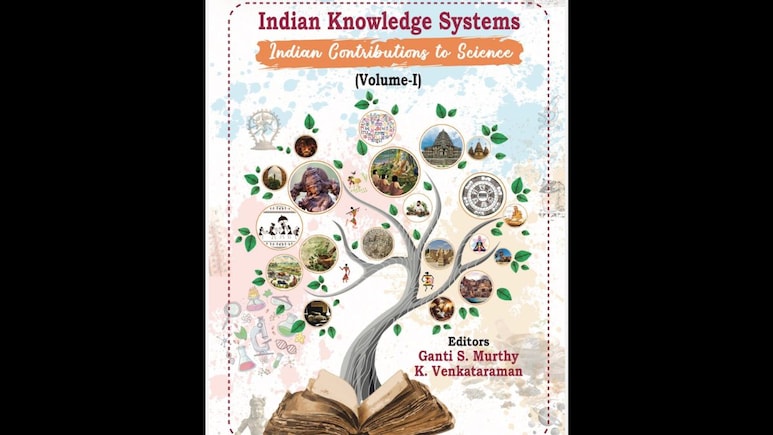
A new book by the Union Education Ministry's Indian Knowledge Systems (IKS) division spotlights India's long-standing scientific traditions. From advanced mathematical discoveries predating modern calculus to an ancient health conference held thousands of years ago in the foothills of the Himalayas.
Titled 'Indian Knowledge Systems: India's Contribution to Science - Volume I', the 430-page book aims to connect ancient Indian insights with modern scientific inquiry and inspire curiosity among students and educators. The book is the first in a proposed multi-volume series being developed under the National Education Policy (NEP) 2020, which emphasises integrating traditional knowledge with contemporary education and research.
Union Education Minister Dharmendra Pradhan described the work as a reflection of India's "rich legacy of scientific enquiry and holistic wisdom." He said the book would "inspire curiosity, strengthen cultural confidence and motivate our youth to contribute to building a developed India by 2047."
A Bridge Between Ancient And Modern Science
Authored by eight academicians and edited by GK Venkataraman, former curator at the National Council of Science Museums, and IIT Indore professor Ganti S Murthy, the book covers a wide spectrum of subjects, including Indian astronomy, mathematics, chemistry, Ayurveda, medicinal plants and sustainable agriculture.
Professor Anil D Sahasrabudhe, chairman of the National Educational Technology Forum, wrote in the foreword that the book is "not merely a record of past achievements, but a bridge connecting timeless knowledge to modern scientific inquiry and innovation."
The book highlights that scholars in medieval Kerala, led by Madhava of Sangamagrama in the 14th century, explored infinite series long before Isaac Newton and Gottfried Wilhelm Leibniz formalised calculus in Europe. It also notes how Indian astronomy employed sophisticated instruments such as the 'Ghatika Yantra' and 'Samrat Yantra' for empirical observations, and how Indian traditions maintained harmony between science and spirituality, unlike the frequent clashes between science and religion in the West.
Focus On Ayurveda's Ancient Roots
One of the most striking accounts in the book is that of a conference on health and disease management held in ancient India, said to have taken place on the slopes of the Himalayas. According to the book, Āyurvedic ācāryas (teachers) from across India and neighbouring regions gathered to discuss ailments affecting not just humans, but also animals and plants.
Vedic sage Bharadvāja is said to have presented the foundational principles of Ayurveda including the causes of disease, symptoms, and treatment which were later debated and codified under the guidance of Atreya, his renowned disciple. The proceedings of this ancient medical assembly, cited from the 'Charaka Samhita', are described as one of the earliest known efforts at structured medical documentation.
An illustration in the book even depicts an ancient eye surgery on a horse, based on the Śālihotra Saṃhitā, highlighting the advanced veterinary science that existed in India.
"Āyurveda should not be seen merely as a reminder of past glory," the book states, "but as a living system with contemporary relevance."
Impact of colonisation and knowledge revival
The book also examines how colonisation disrupted India's indigenous knowledge systems. It describes colonial rule as a "system of economic, cultural, and intellectual control," which portrayed Indian civilisation as backward to justify domination.
It traces the process through three phases, conquest, exploitation, and intellectual subjugation. From the early Arab invasions to the British education policies of the 19th century that replaced local systems of learning with English education. Yet the authors note that "decolonisation and colonisation proceeded simultaneously," pointing to India's continuing efforts to revive its intellectual and scientific traditions.
For classrooms and beyond
Designed for students of Classes 6 to 12, the book will also serve as a resource for the Vidyarthi Vigyan Manthan- a national science talent exam organised by Vijnana Bharati in collaboration with NCERT and the National Council of Science Museums. The IKS division said it is also meant for higher education institutions, researchers, and readers interested in India's intellectual history.
The editors describe it as a "celebration of India's creativity and wisdom," adding that it should serve as both an inspiration and "a compass for anyone navigating the vast and vibrant ocean of Indian knowledge."
Criticising the push to mainstream Indian Knowledge Systems (IKS) within higher education, Abha Dev Habib, Associate Professor of Physics at Delhi University's Miranda House, called the new volume "propagandist in intent," adding that it is "dangerous and regrettable that government institutions are legitimising such distortions before the next generation instead of addressing the real crisis of children still being deprived of basic education."
The book, she added, "lacks empirical grounding and substitutes historical rigour with glorified conjecture." "The emphasis," she argued, "should be on ensuring access to quality education for every child, not on romanticising a selectively edited past. A nation cannot advance by fabricating pride, it must invest in safeguarding the intellect and integrity of its future citizens."
